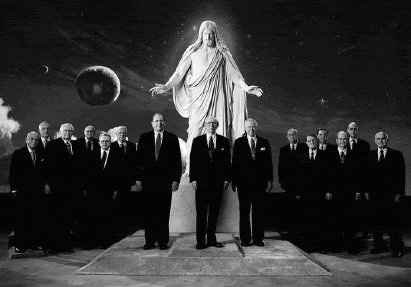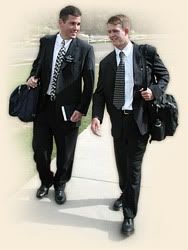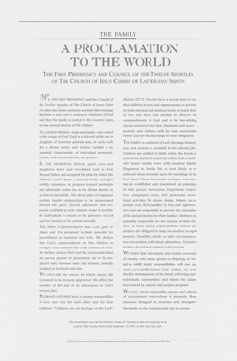 It has always confused me why my Christian friends would insist that my religion should be considered a cult. First off, I am not sure just what my friends mean when they call my faith a cult. In actuality, I am not sure my friends know what they mean when they call the LDS religion a cult. What is a cult? The American Heritage Dictionary defines "cult" this way:
It has always confused me why my Christian friends would insist that my religion should be considered a cult. First off, I am not sure just what my friends mean when they call my faith a cult. In actuality, I am not sure my friends know what they mean when they call the LDS religion a cult. What is a cult? The American Heritage Dictionary defines "cult" this way:
1. A religion or religious sect generally considered to be extremist or false, with its followers often living in an unconventional manner under the guidance of an authoritarian, charismatic leader.
2. A system or community of religious worship and ritual.
If by definition one, my friends consider the LDS religion a cult, then they are comparing my faith with destructive organizations like those created by Jim Jones, Charlie Manson, David Koresh, and Aum Shinrikyo. The LDS people do not live in a false or unconventional manner unless you believe that morality, chastity, fidelity, sobriety, modesty, and humility are unconventional and extremist. If the LDS religion is accult by definition two, then all religions are cults and anyone who associates with a religion, mainstream or not, is a member of a cult.
According to a new article at HSW, there are specific characteristics of destructive extremist organizations that clearly sets destructive cult groups apart from religion. I will show that the LDS faith is clearly a mainstream religion and not a cult.
1. Charismatic leadership. all cults are led my a single leader who demands complete and unconditional allegience. People are drawn to this leader by the power and attraction of his personality. This attraction to a charismatic personality is often constrasted by their dissallusionment with society and the institutions of society.
The LDS faith is led by a president who is referred to as the prophet. But is being led by a presidents mean that we are a cult. If that be the case than any organization with a president is a cult. Members of the LDS faith accept and sustain the president of the church as having the authority to speak for God. I suppose the belief that someone else can tell you what God wants you to do is a cause for concern for most people.
The LDS church, from the beginning, has a system of checks and balances just like the US government. In addition to the prophet who is a member of a group of 3 men who lead the church known as the the First Presidency, the LDS church is also governed by a quorem of 12 Apostles and quorem of the 70. The Doctrine and Coventants explains in D&C 107: 24, 26, 36-37 that the voice and authority of the 12 Apostles is equal to that of the First Presidency and the authority of the 70 is equal to that of the 12. In fact, each local governing High Council led by 3 persons known as a Stake Presidemcy has authority equal to that of the 12. While a cult leader would seek to reserve all power and authority to himself, the President of the Church of Jesus Christ delegates to local leadership.
I just don't think its fair to call a church a cult just because it has central leadership. Lets not forget there are clear advantages of having a church that has central leadership. One is that there is a standardization of doctrine. No offense, but accoring to my Christian friends, different doctrine can be taught at their church on any given Sunday. When I ask them if they believe everything their pastor teaches, they say, "no way, but I know what I believe." This individual religion has become the most popular religion in the world. However, a person could travel to LDS churches around the world and on any given Sunday, he or she would hear the same doctrine taught and feel the same Holy Ghost testify of truth. In fact, the LDS church has standardized their Sunday School lessons so, he or she would actually hear the exact same lesson taught anywhere in the world.
Also, it is important to know that the Priesident of the Church has never asked that the members blindy follow his counsel. Joseph Smith and the prophets since have always pleaded with the members to first gain their own testimony or spiritual witness that what they are asking them to do is God's will. This lesson is exemplified by the Joseph Smith's first vision when he asks God for himself which of all the churches is true. Joseph Smith promised that each of us could recieve personal revelation just as he had done and know for him or herself the truth. Every first Sunday of each month in every LDS church in the world, a testimony meeting is held where members stand before the congregation and share that witness. This is not a church where the blind lead the blind. Rather, every individual member has a burning witness in their heart that Jesus is the Christ, and that the LDS chruch is His kingdom.
President Boyd K. Packer in the April conference of 1983 taught us about this: “Latter-day Saints are not obedient because they are compelled to be obedient. They are obedient because they know certain spiritual truths and have decided, as an expression of their own individual agency, to obey the commandments of God. … We are not obedient because we are blind, we are obedient because we can see” (“Agency and Control,” Ensign, May 1983, 66).
Now the church does ask that if that personal witness is slow in coming that the members first act on faith, promising that a personal witness will follow. This call for faith should not be construed as asking that LDS members blindly follow their leaders. Christ taught this principle that you can't know whether a priniciple is true until you try it (John 7: 17)(Ether 12: 6).
"Sometimes it is necessary to be obedient even when we do not understand the reason for the law. It takes faith to be obedient. The Prophet Joseph Smith, in teaching obedience, said that whatever God requires is right, though we may not know the reason until much later" (see Teachings of the Prophet Joseph Smith, sel. Joseph Fielding Smith [1976], 256).
2. Deception in recruiting. Recruiting does not make a cult. Many organizations recruit. Jesus Christ commanded his disciples to "teach all nations" and "baptise" converts to his kingdom. I am not aware of any deception in the LDS recruiting process. As a missionary of the LDS church, I shared the doctrines of the church, and invited others to pray and ask God if the things we were teaching were true. If inviting others to recieve a witness from the Holy Ghost on their own is deception than it is not the missionaries who lie, it's those who say they have recieved an answer. But that would require a belief that God does not answer prayer. Does not the Bible teach, "Ask and ye shall recieve, knock and it shall be opened unto you"?
3. Use of thought-reform methods. A.k.a Brainwashing. The LDS church presents doctrine and uses the persuasion of patience and love but never compulsion (D&C 121: 41). The LDS church recognized everyones individual agency and right to choose for him or herself (2 Ne. 10: 23). Also, we do not deny the power of the Holy Ghost. We teach truth my a combination of logic and conscience. I have met mainstream Christians apoligeticists who claim that everything in the Bible is understood by reason and pure logic only and deny the role of the Holy Ghost. I agree that if a person had the understanding of God that the story of Moses parting the Red Sea would seem entirely logical. However, I must rely on faith and the feelings of my conscience that help me to decern truth even when something is outside the realm of my understanding, reason, logic, and experience. "Howbeit when he, the Spirit of truth, is come, he will guide you into all truth" (John 16: 13). If mainstream Christianity denies the workings of the Holy Spirit, than they are no better or different in philosophy than a sociologist except being trained by studying fables instead of prospective, randomized, double-blinded, placebo controlled trails.
4. Isolation (physical and/or psychological): Members of the Chruch of Jesus Christ of Latter-day Saints live in over 150 countries worldwide. The church has more members outside the United States than within the United States. Members of the LDS church serve in areas of government, business, education, military, athletics, healthcare, etc. Some prominent LDS members are listed at famousmormons.net.
LDS members also try and be good neighbors and productive, law abiding members of their society. Also, my wife points out, all LDS meeting house signs read "visitors welcome." We do not require a period of "brainwashing" before church attendance. As far as Temples are concerned, there is nothing mystical about dressing in white, hearing the creation story, and promising to keep the 10 commandments. The reason the general population is not permited access to LDS temples is because a person should show that he or she is striving to keep the commandments and has been born again before making promises in the Temple to live the commandments. It doesnt make sense to make promises you don't intend to even try to keep.
5. Demand for absolute, unquestioning devotion and loyalty. There is an expectation for unity in the church. Members are free to question any doctrine or decision and take it to church leadership, the scriptures, and the Lord in prayer. There is not different factions within the chruch such as orthodox mormons, concervative mormons, and liberal mormons. There is an expectation that members do "not speak evil of the ruler of thy people" (Acts 23: 5). Also, the Bible teaches to not "steady the Ark" which means that there is an appropriate and ordered way in which the church is governed and mistakes corrected (Num. 1: 51)(2 Sam. 6: 6 (6-7))(1 Chr. 13: 10 (9-12))(D&C 64: 17). The LDS church does not teach that it's leaders are infallible however we are taught that if we follow the majority of the 12 and the First Presidency, God will never cause that we should be led astray.
6. Sharp, unsurpassable distinction between "us" (good, saved) and "them" (bad, going to Hell): LDS doctrine has always taught that all people on earth will be resurrected, saved from Hell, and inherit some level of heavenly glory(1 Cor. 15: 40). Christians who believe the will live with Christ eternally will be rewarded exactly what their faith promises them. LDS Doctrine teaches that this concept of Heaven is limited and that there is more possible. On the other hand, I have met plenty of mainstream Christians that are sure that I am going to be "burn in hell" for my blasphemous faith.
7. "Inside language" that only members fully understand: All organization have a problem with this. The military has its accronyms, the catholic church, business, and not to mention medicine. Language is a refection of any culture within an organization and doesn't have anything to do with whether something is a cult or not.
8. Strict control over members' daily routines: Mormon life from the outsider's perspective seems very restrictive. LDS members refrain from tobacco, coffee, tea, alchohol, sex before marriage, among other addicting and negative influences. However, as an insider, there is noone making me live this way. I can leave whenever I want. Members don't look at these lifestyle expectations as restrictioins but rather as directions in living a happy life. The church does not control every aspect of life. In fact, most decisions are left up to the individual and family. One of the foundation doctrines of the church is on temporal and spritual self-reliance. The Doctrine and Covenants teaches, "For behold, it is not meet that I should command in all things; for he that is compelled in all things, the same is a slothful and not a wise servant; wherefore he receiveth no reward (D&C 58: 26).
So, according to The American Heritage Dictionary and the HSW website the Mormon chuch is not a cult. So, why does mainstream Christian persist on calling us a cult? If their basis for this assertion is that Mormonism doctrine is different from that of mainstream Christian doctrine? I joyfully aknowledge that Mormon doctrine is different in some aspects from mainstream Christianity. However, I don' think those differences warrant the mainstream from excluding us from being called Christians when we accept Jesus Christ as the Son of God, Messiah, and Savior of the World and calling us a cult when we are not.
 The Ensign is the monthly publication by the Church of Jesus Christ of Latter-day Saints. February contains the amazing and wonderful conversion story of Anthony Atkins, a priest in another christian chruch for 14 years, to the true church of Jesus Christ. This article is entitled "Tell Me It Isn't True."
The Ensign is the monthly publication by the Church of Jesus Christ of Latter-day Saints. February contains the amazing and wonderful conversion story of Anthony Atkins, a priest in another christian chruch for 14 years, to the true church of Jesus Christ. This article is entitled "Tell Me It Isn't True." training at a university in social work and left his profession as a priest. And then we was baptized in the Chruch of Jesus Christ of Latter-day saints and later ordained to the Aaronic and Melchizedek priesthoods and then endowed in the temple. Bro. Atkins ends the article expressing his gratitude for the missionaries who did not give up on him.
training at a university in social work and left his profession as a priest. And then we was baptized in the Chruch of Jesus Christ of Latter-day saints and later ordained to the Aaronic and Melchizedek priesthoods and then endowed in the temple. Bro. Atkins ends the article expressing his gratitude for the missionaries who did not give up on him.















